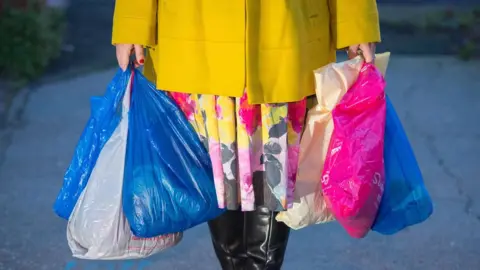Single-use bags and plastic wet wipes face ban in Wales
 PA Media
PA MediaWales could ban single-use carrier bags and plastic wet wipes in a delayed plan to reduce plastic waste.
Climate Change Minister Julie James said she wants to add them to a plastics ban that is yet to be implemented.
With bans on items like straws and cotton buds in place in England and Scotland, there are questions over why Wales is behind.
One Plaid Cymru Senedd member said the delay "beggars belief".
Currently Wales is the only part of Great Britain where there is no ban covering plastic straws, cotton buds and stirrers.
The Welsh government said a piece of post-Brexit legislation had complicated the introduction of a new law that was originally planned for 2021.
No part of the UK has banned either plastic wet wipes or single-use carrier bags, although the UK government is considering a ban on the former in England.
Sewer blockages
If the ban on plastic bags goes ahead, the UK government will probably need to be asked for permission for the Welsh law to be fully put into practice.
The Marine Conservation Society is among those to have called for a ban on plastic wet wipes, saying they can be found on beaches in huge numbers.
They are also blamed as a major source of sewer blockages.
 Getty Images
Getty ImagesWales was the first part of the UK to require retailers to charge for single use carrier bags in 2011. The charge stands at 5p, which must be given to charity.
James Lowman, chief executive of the Association of Convenience Stores, urged the Welsh government to ensure a ban "avoids potential unintended consequences such as customers treating bags for life as single-use bags and throwing them away, and good causes not benefitting from the money raised through the existing successful bag charge".

What are the alternatives to wet wipes and single-use plastic bags?
It has been estimated that 90% of wet wipes contain plastic.
Boots has said it will ban plastic wipes from the end of 2022, while Holland and Barrett has banned wipes altogether.
The latter retailer says that while biodegradable wipes are on the market, concerns have been raised that they would not be able to degrade quickly enough to avoid damaging drains and marine life.
Alternatives include washable cloths and washable baby wipes, and reusable cotton pads.
Meanwhile it has become common to see bags for life made of different materials sold by supermarkets, since the bag charge was introduced.

Wales 'falling behind'
Welsh ministers announced two years ago that they planned to ban a wide range of single-use plastics, including straws, plates, buds, polystyrene food and drinks containers and balloon sticks in 2021.
Despite consultation, a ban in Wales is yet come into force with no date for when legislation will be put to the Welsh Parliament to be passed.
In a letter to the Senedd's climate change committee, Ms James said legislation will come this Senedd term, which ends in 2026.
In the letter she also proposed "to include a ban on the sale of wet wipes which contain plastic and single-use plastic carrier bags in the planned legislation".
Llyr Gruffydd, chairman of the committee and Plaid Cymru Senedd member, said Wales was "falling behind other parts of the UK".
He said Ms James had told the committee she would inform them of the next steps towards a ban by the end of October 2021, "but we saw nothing".
"There is widespread support for this policy. It beggars belief that it has taken so long to see any action," Mr Gruffydd added.
Plaid's climate change spokeswoman Delyth Jewell backed the proposals, saying Wales could "lead the way" on a ban on single-use carrier bags.
The Welsh Conservatives' Janet Finch Saunders said she was "pleased that governments across the United Kingdom are taking legislative action to ban their use", and urged Labour ministers not to "dither".
The Welsh government's original proposals for a ban went further than the initial UK government scheme for England, which came into effect in October 2020 and covers straws, buds and stirrers.
In the meantime Scotland implemented its own plastics ban earlier this month, covering most of the items the Welsh government intended to axe from use with the exception of oxo-degradable plastics.
The European Commission banned oxo-degradable plastics in 2019 over fears they break down into microplastics.
Close the loophole
However the Scottish ban is limited by the post-Brexit UK Internal Market Act, which governs how trade works between the UK's nations, and which means it only impacts items manufactured in Scotland or imported directly.
Businesses in Scotland can legally obtain banned items from other parts of the UK.
The Scottish government is expected to be given an "exclusion" under the act by the UK government, which will close the loophole.
Westminster is also expected to give Wales an exclusion, although the Welsh government says it has formally raised concerns about the scope of what UK ministers have planned.
Currently the Welsh exclusion is limited to items that are banned in Scotland and does not include bags or wet wipes.
The Welsh government is trying to dispute the market act through the courts, and is hoping the Supreme Court will hear its case.
A Welsh government spokesperson said: "Proposals for legislation are currently being developed and details of what will be included and the timescales involved will be announced in due course.
"The introduction of the United Kingdom Internal Market Act in 2020 has complicated the development of legislation to ban single-use plastics in Wales.
"But we are working towards introducing legislation as quickly as possible to ban the most commonly littered single-use plastics."

- EXPLORE ANGLESEY'S RICH WILDLIFE: Iolo explore Wales’ biggest island by land and sea
- ICONIC WELSH PEOPLE, PLACES AND THINGS: Kiri unearths the best clips from the BBC Wales archive

